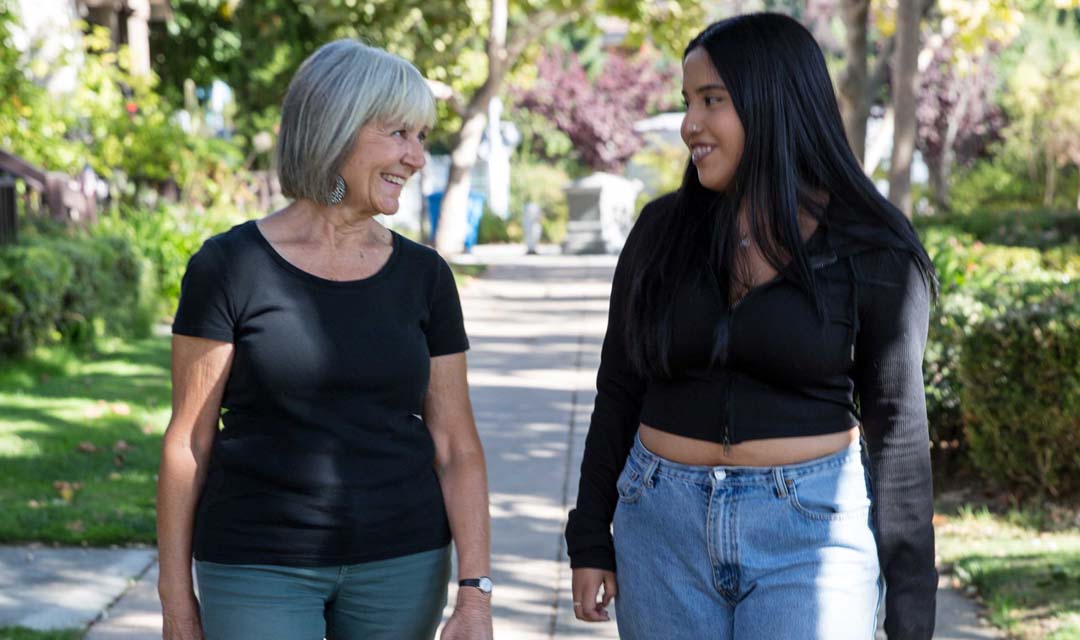MTC mentors are matched with high-school students. The role of the mentor is to be a good listener, a source of support and encouragement, and a caring guide who inspires hope for a bright future. Students are matched with specially trained mentors who listen without judgement, guide with compassion, and encourage wholeheartedly. Our mentored students feel supported and empowered, and each year 100% of them proudly graduate from high school.
Program Overview
Sharing your time and life experience with a young person can be incredibly rewarding. Developing trust, finding common ground, and listening without judgement allows mentors to build meaningful bonds with their mentees. From there, time spent together – trying new things, learning about each other’s cultures and lived experiences, sharing hobbies, and just enjoying each other’s company – is a special and unique experience that benefits both the mentor and the mentee.
Research shows that young people who experience strong developmental relationships across different parts of their lives are more likely to show signs of positive development in many areas, including:
- Increased academic motivation
- Increased social-emotional growth and learning
- Increased sense of personal responsibility
- Reduced engagement in a variety of high-risk behaviors
What do MTC Mentors do?
A mentor is listener, a guide, and a supporter. As a mentor, your role is to support the development of self-esteem, model good communication skills and positive attitudes, and provide guidance around goal setting. You will build trust through active listening, offering understanding, and demonstrating respect. As a mentor, you will be a caring guide, but not a parent or guardian, disciplinarian or peer.
A mentor is expected to be genuine. MTC encourages our mentors to “Just be yourself.” When mentors act naturally and listen in a non-judgmental manner, the experience will be rewarding for both you and your mentee.
Do you want to be a mentor?
Mentor Tutor Connection (MTC) is currently recruiting mentor volunteers for the three high schools in the Mountain View Los Altos High School District (MVLA). For more information about mentoring, please see our Mentoring FAQs.
Interested individuals will attend a New Mentor Training prior to being interviewed by a Mentor Program Manager. If you are interested in learning more about mentoring, please contact us.
Mentor FAQs
What is the time commitment to be a mentor?
Mentors are expected to see their students once a week for the first month, then once every other week or more after that. Mentors will find a time that is convenient for both mentor and mentee. Depending on schedules, mentors may meet with their mentees after school, at lunch, in the evenings, or on the weekends. Generally, a mentor spends an hour or more with their mentee each time they meet.
What kinds of mentors are you looking for?
MTC is looking for individuals who have been successful in life, not necessarily financially, but as members of society who have healthy attitudes, positive outlooks and compassionate dispositions.
Is there training for mentors?
New volunteers are required to participate in a 1.5 hour New Mentor Training. These trainings are delivered by MTC staff multiple times throughout the year and on an as-needed basis. Some of the topics that are covered during the training session include: qualities of a good mentor, best practices, first meetings, mentor/mentee activities and other helpful advice. Additionally, there are mentor mini-trainings offered throughout the year for all current mentors.
Upcoming trainings are posted on the News & Events page of the website.
Do I have the same student all the time?
We hope that the mentor will make a strong connection with their student and will enjoy an ongoing relationship which may last over the course of the mentee’s high school years.
What kind of financial obligations do I have as a mentor?
Mentors are only asked to spend money if there is an expense for any activity they participate in with their mentees. These activities need not be costly. For example, if a mentor and mentee go out to lunch or out for coffee, the mentor is expected to pay. Mentees should never pay for items or activities when they are with their mentors.
Where is the mentor program delivered?
We provide mentors for students who attend Los Altos High School, Mountain View High School and Alta Vista High School. Most activities and meetings occur off campus.
How do I become a mentor or get more information?
Click on the Contact tab at the top of this page and complete the form with your contact information. We will be in touch with you to discuss next steps.
What if I’m not sure whether I want to be a mentor or a tutor?
Please consider attending an MTC Volunteer Information Session where you will learn more about both programs, meet staff from both programs, and have the opportunity to ask questions and get guidance. Please see our upcoming events page for the next session, or watch a recording of a recent session – here.
How to Become a Mentor

Please view our Mentor Volunteer Job Description, or contact us using our contact form to get more information.
If you’re ready to become a mentor, please use our Volunteer Information Form.
A member of the MTC staff will get back to you within two days (mentor volunteers must be 22 or older).
We’re excited to have you join us in our mission to help students students reach their potential and thrive.
Youth Protection
We are strictly committed to providing a safe working environment for our volunteers and the students they work with. Our staff and volunteers undergo annual youth protection training in compliance with the laws and guidelines set forth by the MVLA School District, the Los Altos School District, the Mountain View Whisman School District, the County of Santa Clara, and the State of California. See our Youth Protection Statement

